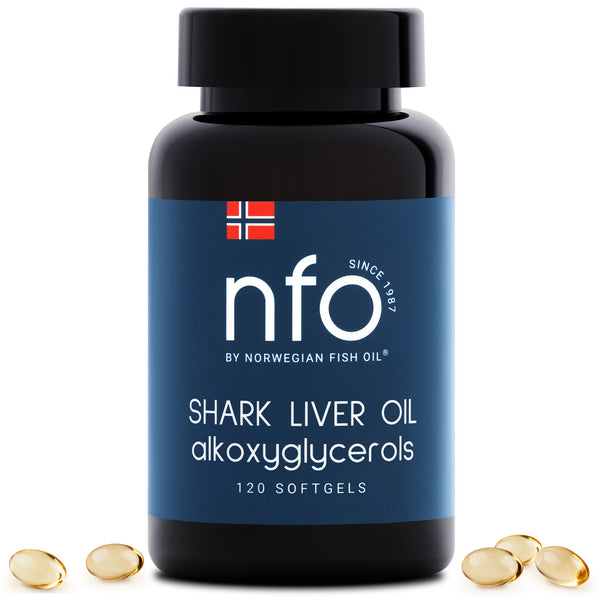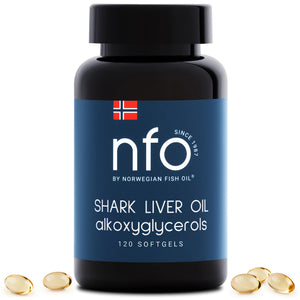
Ready to dive into a wild supplement trend? Meet squalene – the shark-y oil gaining buzz among health nuts. Deep-sea sharks pack their livers with this slick compound (sharks use it to float). Humans have been bottling it up as a supplement too, touting antioxidant, immune-boosting, and cholesterol-balancing superpowers. In Europe, people are curious about squalene’s benefits and what the EU rules say about it. Buckle up, EU shoppers – this is the squalene story you did not know you needed.
What is squalene?
Squalene (pronounced skwah-leen) is basically a natural oil – a long-chain hydrocarbon – found in all kinds of living things. In fact, our bodies and plants make it as a precursor to cholesterol. But certain sharks have loads of it. Some cold-water sharks pack 40–70% of their liver as squalene, which is why fishermen long ago called shark liver oil a “miracle healer.” It is no wonder – sharks even use that oily super-float to stay buoyant under the ocean. Chemically, squalene is rich in double bonds, making it extra stable and good at soaking up oxygen. In simple terms, it is nature’s own skin-smoothing, antioxidant molecule. The EU knows about it too – it is officially a natural substance in food and supplements (and not on any forbidden list).
Squalene’s wizardry comes from its chemical structure: loads of carbon double bonds (unsaturated bonds) that let it gobble up free radicals like a sponge. It is also very slippery and odorless, making it handy in lotions and pills. Importantly, it is not some weird lab chemical – it is endogenously produced in animals (including humans) and found in foods like fish oils. In short, squalene is a naturally occurring shark-and-human-friendly oil with a claim to fame in traditional medicine.
Squalene’s health hype vs. science
People credit squalene (via shark liver oil) with a bunch of health perks. But how much is science, and how much is hype? Here is the skinny on what studies say:
- Heart helper? Some research hints squalene might improve cholesterol profiles. In one controlled trial, subjects who took 860 mg of squalene per day for 20 weeks saw significant drops in total and LDL (“bad”) cholesterol compared to placebo. Squalene appears to slow the body’s cholesterol production (kind of like a mild, natural statin), which could explain those drops.
- Antioxidant power: Because of those extra double bonds, squalene is a champ at neutralizing oxidants. Scientists note it has strong antioxidant (and even oxygen-transporting) properties. That means it can help protect your cells from damage – something beneficial for heart health and aging. (Think of it as your body’s own oil filter, catching harmful free radicals.)
- Immune & recovery: Shark liver oil (rich in squalene) has been used in folk medicine for immunity. Modern lab tests support this: squalene shows antiviral and antibacterial activity and seems to boost immune cells. In Scandinavia and Japan, people have taken it for infections and to recover from wounds or even chemo side effects. While these uses are not fully proven in big human trials, the antioxidant and immune-activating signals are real enough in test-tube and animal studies.
- Other buzzwords: You will also hear about anti-aging, anti-inflammatory, and even anti-cancer claims. It is true that some cell studies show squalene interfering with cancer cell growth. But be clear: that is lab data, not a human cure. As one review put it, squalene has “a wide variety of physiological functions such as anticancer and anti-hypercholesterolemia” in the lab. It is exciting, but for now take those super-cure claims with a grain of sea salt. No official EU health claim has blessed squalene yet.
So yeah, there is real science behind some of the hype – especially heart and antioxidant effects – but it is not magic pixie dust. In casual terms: squalene might genuinely help balance cholesterol and fight oxidation, and it could support immune health. Just remember, supplements are supplementary. It’s smart to keep expectations reasonable even if the label is optimistic.
EU regulation and shark concerns
If you are in the EU, there is a twist: cosmetics vs supplements. The EU Cosmetics Regulation (EC 1223/2009) straight-up bans certain shark-derived ingredients. In fact, shark liver oil (and thus shark-sourced squalene) can be treated as a Category C animal by-product, which cosmetics cannot use. In plain English, you will not find shark-derived squalene in Pond’s, Dove or any cream sold in Europe – plant or synthetic squalane will be used instead.
What about supplements? Here is the relief: no specific EU law says “shark squalene is illegal in pills.” Because squalene has such a long history of human use (it is in old fish oils, olive oil, etc.), it is not classified as a “novel food” needing special approval. So companies can sell shark liver oil capsules with squalene in them, following the usual supplement rules (quality standards, labeling, etc.). In theory, as long as it is safe, it is allowed.
That said, shark conservationists are not thrilled. They note an EU loophole: regulations against illegal fishing do not explicitly cover shark liver oil. Oceana and others warn that pirate fishing vessels target deep-sea sharks for their oil, then slip the product into markets under the radar. The EU has protected some shark species and banned fins, but shark liver oil has been a blind spot.
So key takeaways for EU consumers: shark-squalene creams are a no-go by law, but shark-squalene capsules are not explicitly banned (yet). It is subject to general food safety rules, though no miracle claims are allowed on labels. Just be aware of the ethics: some shoppers prefer to avoid shark products altogether.
How to take squalene: dosage and safety
If you decide to try squalene supplements, here is what to keep in mind – no lecture, just facts:
- Dosage: Always follow the label. Typical shark liver oil pills pack a few hundred milligrams, so you might get ~200–500 mg of squalene per dose (sometimes 1,000 mg, depending on brand). Clinical studies have used doses like 860 mg/day for 20 weeks with cholesterol benefits. That was well-tolerated. But you do not need to go overboard: stick to recommended amounts, usually 1–3 capsules per day with food.
- Safety – heavy metals: Worried about "fish mercury"? The good news is labs have tested shark liver oil supplements, and mercury levels are minuscule. The highest measured daily mercury intake from a shark oil pill was about 0.000092 µg (micrograms). For context, EFSA’s safety threshold for methylmercury is 91 µg per week for a 70kg adult. The tested oils provided fractions of a percent of that. In other words, shark oil pills typically have mercury hundreds of times below EU limits. (Same for other heavy metals.) As long as the product is from a reputable manufacturer that tests purity, contamination should not be an issue.
- Side effects: Squalene is actually something our body makes naturally (it is a cholesterol precursor), so it is generally well-tolerated. The main quirks are fishy burps or aftertaste – shark oil can taste, well, fishy if the pill is not enteric-coated. If you have a fish or seafood allergy, beware (shark = fish). Otherwise, serious side effects are rare. Just like any supplement, the biggest “side effect” might be feeling like you chugged a spoonful of sea – after all, you literally did.
- Labeling and claims: EU law requires supplements to be clear on ingredients. You should see “Shark Liver Oil” or “Squalene” listed. Do not fall for ads promising a “cure.” In the EU, squalene cannot legally claim to prevent or treat diseases. You might see general statements like “rich in antioxidants” or “supports immunity” (those have some backing) – but no official health claims from EFSA are authorized yet. In short: buy trusted brands, follow dosage, and take those lofty slogans with a grain of sea salt.
Bottom line
So, what is the verdict on squalene for EU shoppers? It’s an interesting, natural compound with real bioactivity, and EU rules do not forbid its use in supplements. Scientific studies do suggest some health perks (like cholesterol support and antioxidant action). And the scary stuff? Well, top-tier labs find no safety alarms – mercury and contaminants are way below concern.
Of course, it is not a magic potion. No one’s turning into a shark after a pill. Always remember: supplements complement, not replace, a healthy lifestyle. If you do jump on the squalene bandwagon, choose a high-quality product from a transparent EU supplier. And hey, sharks keep on swimming – maybe we should too, with awareness. In the end, squalene is a shark’s gift to human health (with caveats). Whether you take it or skip it, you now know the science and the law. Stay savvy, stay safe, and enjoy the sea of knowledge!
References
- European Commission. Regulation (EC) No 1223/2009 on cosmetic products. Official Journal of the European Union.
- European Commission. Regulation (EC) No 178/2002 laying down the general principles and requirements of food law. Official Journal of the European Union.
- European Commission. Animal by-products Regulation (EC) No 1069/2009. Official Journal of the European Union.
- EFSA (European Food Safety Authority). Scientific opinion on the risk for public health related to the presence of mercury and methylmercury in food. EFSA Journal, 2012.
- EFSA. Food supplements in the EU – guidance for manufacturers and consumers. European Food Safety Authority.
- Smith TJ. Squalene: potential chemopreventive agent. Expert Opinion on Investigational Drugs, 2000.
- Smith TJ. Squalene: potential role in cancer and cholesterol modulation. Pharmacological Research, 2000.
- Chan P, Tomlinson B, Lee CB, Lee YS. Effect of squalene on serum cholesterol and triglyceride levels in humans. International Journal of Food Sciences and Nutrition, 1996.
- Aranda FJ, Villalaín J. The interaction of squalene with phospholipid membranes. European Journal of Biochemistry, 1997.
- Oceana Europe. Shark liver oil loopholes in the EU. Oceana Report, 2021.
- Huang ZR, Lin YK, Fang JY. Biological and pharmacological activities of squalene and related compounds: potential uses in cosmetic dermatology. Molecules, 2009.
- Prieto JM, Recio MC, Giner RM, Máñez S, Giner-Larza EM, Ríos JL. Pharmacological profile of squalene and derivatives. Planta Medica, 2003.



